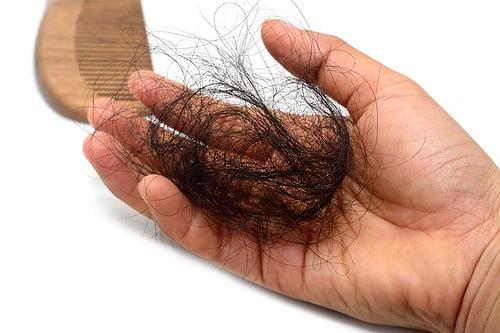REASONS FOR HAIR LOSS
Hair loss is normal, and most people lose between 50 and 100 hairs per day. This small amount of loss usually goes unnoticed on your head, with over 100,000 hairs and new hair readily replacing the lost hair. If you notice that you’re losing more hair than usual via clumps in the drain after you wash your hair or thin patches and baldness on your head, it’s time to talk to your doctor. Your doctor can help you pinpoint the underlying cause of your hair loss and work with you to find an appropriate and effective treatment.
What Causes Hair Loss?

According to the American Academy of Dermatology, over 80 million men and women in America are affected by alopecia or hair loss. Hereditary male- or female-pattern baldness is the most common cause of hair loss, resulting from a family history of hair loss. Specific sex hormones cause this type of hair loss, and it can begin as early as puberty. Male-pattern baldness results from the hair follicles becoming sensitive to Dihydrotestosterone (DHT). The crown and frontal hairline areas are typically the most affected by DHT, which causes the horseshoe-shaped pattern of hair loss in many men.
Other causes of hair loss include traumatic events, surgeries, and major illnesses, and sometimes the loss results from a halt in the hair growth cycle. Hormonal changes can also affect hair loss, including:
- Birth control pills.
- Pregnancy.
- Childbirth.
- Menopause.
- Low or high testosterone
Certain medications can also cause hair loss, such as those used to treat:
- Heart problems.
- Depression.
- Arthritis.
- High blood pressure.
- Cancer.
Medical conditions can cause hair loss as well, including:
- Alopecia areata, which is an autoimmune disease that attacks your hair follicles.
- Thyroid disease.
- Scalp infections such as ringworm.
Emotional or physical shock is yet another cause of hair loss, such as shock resulting from:
- Extreme weight loss.
- Obesity
- A very high fever.
- Death in the family, particularly one that’s unexpected or sudden.
Hair loss can also result from traction loss due to hairstyles that pull the hair back very tightly or be caused by trichotillomania, a hair-pulling disorder. If you lack iron, protein, or other nutrients in your diet, you may also experience hair loss.
How Is Hair Loss Diagnosed?
If you suspect that you’re experiencing hair loss, you’ll need to see a hair restoration specialist or dermatologist for an official diagnosis. They will want to determine the cause of hair loss in order to set up a treatment plan. Sometimes, simple changes in your diet can help reduce hair loss, but it may require treatment to restore it. Your doctor may also look at adjusting any medications you’re taking for other disorders or diseases.
Your clinician or dermatologist should perform a thorough physical examination and medical history to diagnose hair loss. If a skin disease or autoimmune disease are suspected to be the culprit, then a biopsy of your scalp may be taken for testing in a laboratory. Hair loss is a complex process, and the exact cause of your hair loss might be difficult to determine. Although, in most people, it’s genetic and easily identifiable.
What Treatment Options Exist for Hair Loss?
After determining the cause of your hair loss, your clinician or dermatologist may offer various treatment options, from medication to medical procedures. The treatment plan will target your type and cause of hair loss and effectiveness will be determined based on your likelihood to respond.
Medication
The first option for hair loss treatment will likely be medication, including over-the-counter topical creams and gels that you can apply to the scalp to stimulate hair growth. The most common products contain minoxidil or fin########, which has proven to be effective in improving hair density in some patients. Fin######## is also effective at slowing down pattern loss and even reversing miniaturization. Fin######## can be prescribed orally or topically, depending on your needs. Fin######## blocks the production of DHT by nearly 70%.
Options for treating autoimmune hair loss are limited, most providers typically try some form of coticosteroid. Increasing the amount of corticosteroids in the body reduces inflammation and can suppress the immune system, preventing it from attacking your hair follicles. Using corticosteroids can put you at higher risk for conditions such as:
- Calcium loss, leading to osteoporosis.
- Thin skin and easy bruising.
- Infections.
- Sore throat.
- Hoarseness.
Any use of medication should be closely monitored for side effects, including:
- High blood sugar.
- Fluid retention and swelling in the lower legs.
- Increased blood pressure.
- Cataracts.
- Glaucoma.
Medical Procedures
If medication doesn’t stop hair loss, medical procedures can be used to treat hair loss. These procedures include hair transplant surgery, non-surgical regenerative injections, and collagen induction therapies.
- Hair transplant surgery. This type of medical procedure involves moving or transplanting small grafts of hair follicles from a donor area on your scalp to the area experiencing baldness. Hair transplant surgery is an excellent aesthetic procedure for those with inherited baldness since the hair loss is usually on the top of the head, while the donor area in the back typically remains intact. One type of hair transplant surgery is follicular unit transplantation.
Contact MAXIM Hair Restoration Today
If you’re experiencing hair loss, contact the knowledgeable team at MAXIM Hair Restoration today to see if you’re a good candidate for a hair transplant or non-surgical procedure. We can provide you with an estimate for your procedure as well as how many grafts would be required to give you the best results. Contact us at 802-370-3227 in the United States, or complete our secure online contact form to request your complimentary consultation today. We can meet with you at any of our MAXIM Hair Restoration locations or consult via video or phone call.

